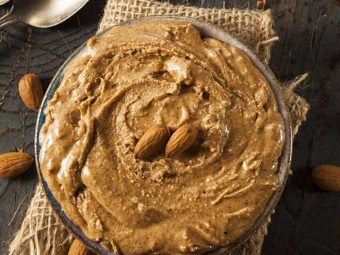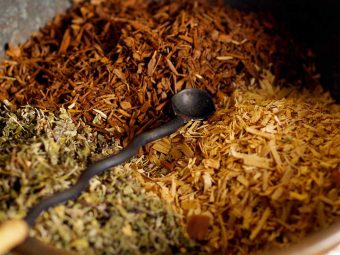Top 11 Castor Oil Benefits For Health, Uses, & Side Effects
From relieving constipation to boosting hair growth, this oil can do exceptional good.
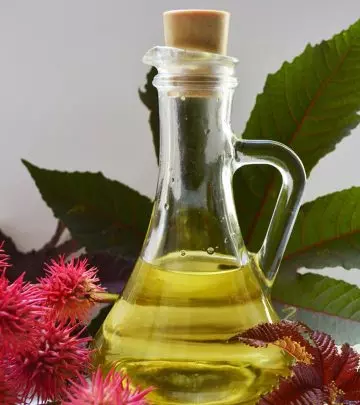
Image: Shutterstock
Castor oil is a multi-purpose vegetable oil known for its therapeutic value. It is extracted from the seeds of the Ricinus communis plant. The benefits of this known triglyceride can be attributed to its anti-inflammatory, antimicrobial, and laxative properties that help treat many ailments. It also was used to induce labor in ancient Egypt.
Castor oil may also help relieve constipation, treat eye irritation, ease arthritis symptoms, and be used as a natural moisturizer. This liquid is colorless to pale yellow and has a distinct taste and odor. It is commonly used in the preparation of medications, and skin and hair care products.
This article explores the potential health benefits of castor oil, its nutrition facts, and the possible side effects. Keep reading.
 Know Your Ingredient: Castor Oil
Know Your Ingredient: Castor OilWhat Is It?
An odorless and almost tasteless oil extracted from castor seeds.
What Are Its Benefits?
It has hydrating anti-inflammatory properties that help with acne, constipation and warts. It is also beneficial for hair health.
Who Can Use It?
Anyone can benefit from castor oil use, as long as they are not allergic to it.
How Often?
The topical application dosage can vary depending on the individual and the intended use. However, 1-2 tablespoons of castor oil per day is safe.
Caution
Pregnant women must avoid consuming castor oil as it can cause allergies, diarrhea and in sever cases premature labor.
In This Article
How Does Castor Oil Work?
Castor oil is a popular source of ricinoleic acid, a monounsaturated fatty acidi XHealthy diet fat with an unsaturated carbon bond in the molecule and is present in nuts, oils, seeds, and fish. (1). Some of the goodness of the oil can be attributed to this fatty acid.
The oil is mostly odorless. Some users describe it as having a light and clean smell (or even a pungent smell). It is nearly tasteless, though some users dislike its taste.
However, there are some concerns associated with the ingestion of castor oil. We will discuss that in detail in the latter part of this post.
Some sources state that castor oil has a comedogenic rating of 1 (on a scale of 0 to 5) (2). The comedogenic rating tells you if a particular ingredient blocks skin pores. The lower the rating, the better. As of now, more research is being done on this aspect of the oil. But a comedogenic rating of 1 means it suits most skin types and doesnt clog skin pores.
 Trivia
TriviaBefore we discuss the benefits of castor oil, learn more about its different types in the next section
Types Of Castor Oil
There are two types of castor oil:
- Yellow Castor Oil
Also known as cold-pressed castor oil, it is extracted from castor seeds at a low temperature (below 49 °C/120 °F), followed by a refining process that involves no heat or chemicals to retain most of the natural properties of the oil. It is often used for cosmetic and medicinal purposes.
- Black Castor Oil
Also known as Jamaican or African black castor oil, it is extracted by pressing roasted castor seeds instead of the regular unroasted variety. The roasting process gives the oil its dark brown or black color and a unique aroma. Anecdotal evidence suggests that it also enhances its effectiveness and improves hair health.
Castor seed oil is one of the most potent seed oils. We have some research backing its health effects. Keep reading, and you will know what castor oil is used for and its benefits.
What Are The Health Benefits Of Castor Oil?
Castor oil benefits are widely researched. The most important use of castor oil is as a laxative to relieve constipation. Its anti-inflammatory properties help treat medical conditions like arthritis pains and other cosmetic issues like acne, scars, and dandruff. If you are wondering what is castor oil good for, scroll down to know in detail!
1. Help Treat Constipation

One important benefit of castor oil is that it helps relieve constipation. The oil is a stimulant laxative. When you ingest castor oil, it causes your bowels to move a lot more (3).
But keep in mind to use the oil sparingly. Excess use of stimulant laxatives can impair the functioning of your bowel muscles (3). Hence, make sure to consult your doctor.
Studies show that castor oil packs (covered in a later section in this article) can relieve symptoms of constipation. They can reduce straining during defecation and induce a feeling of complete evacuation post-bowel movement (4).
Be wary of the dosage, though. A typical dose is 15 ml, which equals about 3 teaspoons. You should experience bowel movements within 2 to 3 hours after taking the oil.
Using castor oil for treating constipation may also lead to nausea or vomiting. This is a normal side effect. But if you experience too much of it, stop use and visit your doctor.
2. Induce Labor
Sometimes, when you are overdue, you may want something to jump-start your labor. Here’s where castor oil might help.
The labor-inducing properties of castor oil stem from the fact that it is a laxative. It causes spasms in the intestines. This stimulates the bowels and the vagal nerve. This irritates the uterus and can make it contract (5).
A small study shows that women receiving castor oil are more likely to go into labor within 24 hours (6). Another study describes castor oil as a safe non-pharmacological method for labor induction (7).
Castor oil can also induce labor in post-date multiparous (having borne more than one child) women (8).
But in another larger study, there was no induction of labor post the use of castor oil. The study reported no harm to the mother or the baby (9).
Hence, the studies are mixed. Castor oil may not have negative effects, at least in most cases. But should you use castor oil for inducing labor?
Inducing labor is a healthy medical decision made for the safety of you and your baby. It is recommended during late-term (between 41 weeks and 41 weeks and 6 days) pregnancy. But each pregnancy can be different, so speak to your doctor first. You may also use castor oil as they direct.
3. Treat Arthritis
Castor oil reduces inflammation. The ricinoleic acid it contains has excellent analgesic and anti-inflammatory properties (10). The topical application of this acid showed a marked anti-inflammatory effect.
Another study showed that castor oil could be used for treating primary knee osteoarthritisi XA form of arthritis in which the protective tissues at the joints of the bones wear down gradually and worsen over time. effectively (11). Subjects with osteoarthritis, when given a castor oil capsule thrice daily for four weeks, showed improvement in their symptoms.
Using castor oil for treating arthritis is quite simple. You can apply it topically or use a castor oil pack.
4. Treat Plantar Fasciitis
Plantar fasciitis involves the inflammation of the thick tissue running across the bottom of your foot, connecting your heel bone to your toes.
In a study, castor oil offered great relief to patients dealing with plantar heel spursi XA condition in which the calcium deposits build up on the heels and a bony projection occurs from the heels making it uncomfortable to walk. (12). Plantar heel spur is a condition associated with plantar fasciitis.
5. Ease Symptoms Of Fibroids
Fibroids are tumors that develop in the uterus. They are benign and non-cancerous.
There is no research stating the beneficial effects of castor oil in treating fibroids. But some anecdotal evidence suggests that the oil may ease constipation (which is a major symptom of fibroids).
Placing a castor oil pack over the pelvis for about 30 minutes may help ease the associated pain. Some believe it may increase the flow of energy to the area. But there is a lack of scientific evidence to validate these effects.
6. Treat Hemorrhoids
Hemorrhoids are swollen veins in the lowest part of your rectum and anus. These often cause discomfort and bleeding.
Research shows that castor seeds can be used for treating hemorrhoids (13). This can be attributed to the anti-inflammatory properties of the seeds and the oil.
However, there is no information on the effectiveness of castor oil is in this regard. Do check with your doctor.
7. Help Delay Signs Of Aging
Though the oil has properties that delay signs of aging (like wrinkles), there is no direct evidence. We know that the oil fights inflammation. This can help combat free radicals that accelerate aging.
You may use the oil under your eyes, around your mouth, on your forehead, and on the chin and neckline. Wash these areas in the morning and apply a drop of castor oil. Gently massage and leave it on for about 20 minutes. Wash off with normal water. You can then follow up with your regular skincare routine.
But be wary of skin reactions. These may include itching, redness, swelling, and rashes. Do a patch test before you apply castor oil on your skin.
8.Treat Acne And Scars
The anti-inflammatory properties of castor oil can help in this regard (14). Using the oil for treating acne is quite simple. Cleanse your face. Moisten a clean washcloth with lukewarm water and add a couple of drops of the oil to it. Gently rub the cloth over your face in circular motions.
You can follow this method before going to bed. Allow the castor oil to stay on your face overnight. You can wash it off the following morning. But if you have oily skin, use castor oil very sparingly.
This method can also be used for treating scars. It may help treat skin inflammation and soothe irritated skin.
Applying liberal amounts of the oil can also help fade stretch marks (15). Apply castor oil to the affected areas, once in the morning and once at night.
Castor oil can also heal sunburns. It has an SPF value of around 6 and is often used in sunscreens (16).
The oil also plays a role in wound healing. Research shows that formulations containing castor oil promote wound healing. They help shed damaged skin cells, stimulate localized blood flow, and have local antimicrobial and analgesici XThe property or drug that helps get relief from the pain without the need for numbing the nerves or altering sensory perception. actions (17).
Castor oil may also help treat boils and burns. But make sure to do a patch test first.
9.Treat Psoriasis And Eczema
Animal studies show that the ricinoleic acid in castor oil can relieve pain and inflammation (10). These properties may potentially help relieve psoriasis and eczema. We don’t have direct research supporting these claims, though.
You can apply the oil to the affected areas before going to bed. Let it get absorbed overnight. The oil supposedly moisturizes the skin.
Castor oil can also fight Candida, a fungal infection. In a study, castor oil had eliminated Candida albicans from contaminated human tooth roots (18).
Castor oil may also aid the treatment of melasma, a condition that leaves brown patches on ones face. A study showed that a phenol-castor oil peel reduced pigments in a severe case of melasma (19).
Some research also shows that the oil can treat ringworm, thanks to undecylenic acid, one of its active compounds (20).
10.Treat Genital Warts
Anecdotal evidence suggests that applying castor oil to the wart every day can help make it fall off. In addition, you can also apply a thin slice of garlic and tape it in place (21). This may further help remove warts.
11.Boost Hair Growth
There is no clinical evidence to suggest that castor oil may boost hair growth. But you may try it out. Apply the oil to your scalp and leave it on for at least two hours. Wash your hair with shampoo.
Diana, a blogger, used castor oil to improve her hair health. She said, “Massaging it into my scalp felt like a spa day, and the results were jaw-dropping. My hair became shinier, thicker, and stronger (i)”.
The anti-inflammatory properties of castor oil may help treat dandruff. It may also help in treating seborrheic dermatitis, which is another inflammatory condition causing scaly patches on the scalp (22).
Some proponents of castor oil also state that it may treat split ends. They also state that a mixture of jojoba oil, mustard seed oil, and castor oil may reverse gray hair. But there is no research to support these statements.
Castor oil might seem like an all-powerful ingredient. Though most of its benefits are backed by research, some of them need concrete substantiation.
It is important we know what this oil contains. As we uncover more research studies, we can understand how its other constituents contribute to its goodness.
What Is The Nutritional Composition Of Castor Oil?
The most abundant constituent of castor oil is ricinoleic acid. It constitutes about 90% of the oil (1). Other acids include:
- Linoleic acid (4% of the oil)
- Oleic acid (3% of the oil)
- Stearic acid (1%)
- Other linolenic fatty acids (>1%)
Earlier, we discussed the importance of castor oil packs in treating certain ailments. Let’s now understand how to make one.
How To Make A Castor Oil Pack
Castor oil is an effective home remedy for several issues. Keeping a castor oil pack handy can help in times of need. Here’s how you can make one:
What You Need
- Pure hexane-free castor oil
- 1 large glass jar with lid
- Dye-free wool, unbleached
Directions
- Fold the dye-free wool over three times. You must have three layers.
- Put this wool into the glass jar. Pour in some castor oil. Shake the jar to distribute the oil into the cloth.
- You can remove the cloth when required and use it. This is your castor oil pack.
Before using the pack, spread some old towels on the floor. Lie down on them. Remove the castor oil pack from the jar and place it on the affected areas of your body. You can then cover this with a plastic wrap.
Lying down with your feet slightly elevated works best. You can stay in that position for 20 to 30 minutes. Allow the oil to soak into the affected areas. Once you are done, you can wipe the excess castor oil off the area using a clean, dry cloth.
The pack is easy to make, isn’t it? But before you go ahead making it, you must be aware of its possible side effects.
Does Castor Oil Have Any Side Effects?
- May Induce Labor
Though this could be a benefit in a way, it can also be an effect you wouldn’t desire. Women in all stages of pregnancy must avoid consuming castor oil (8). Also, if they need to consume it, they must do so only after consulting their doctor.
- May Cause Diarrhea
This has to do with ricin, a potentially dangerous constituent of castor oil. Though ricin is removed in the process of refining castor oil (the one you get in the market), you need to be careful. The related side effects of castor oil include diarrhea, colicky abdominal paini XA cramp-like pain that occurs due to an issue with the internal body parts. It usually originates in the small or large intestine. , vomiting, and even heartburn (23).
 Did You Know?
Did You Know?- Can Cause Allergies
Castor oil can cause allergic reactions in some people when applied to the skin. Hence, we suggest you do a patch test before using it on your skin. This can prevent false-negative results (24).
Infographic: What To Know About Castor Oil
Castor oil is multipurpose vegetable oil with many benefits. It is well-known for its therapeutic value and helps treat many ailments. But you should be aware of certain important characteristics before selecting it. Click on the infographic below to learn what you should know about castor oil before adding it to your regimen and its different types. Illustration: StyleCraze Design Team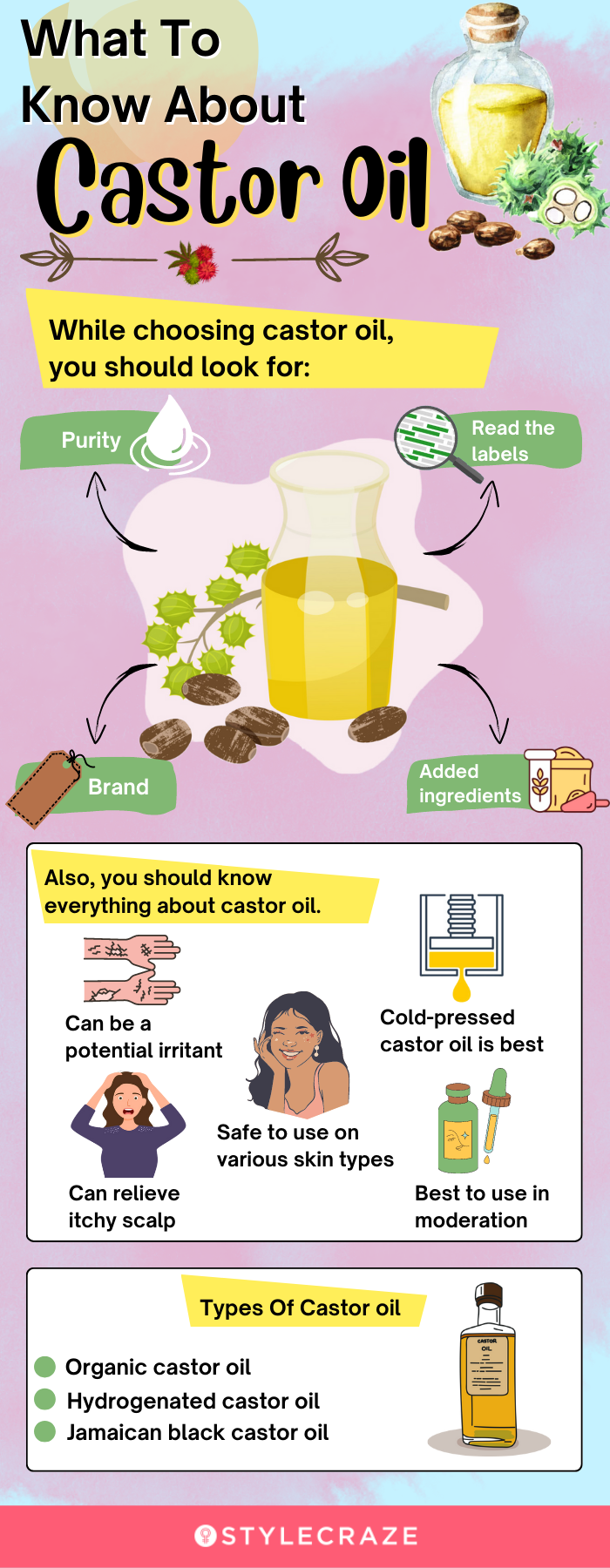
Castor oil is one of the most popular cooking oils on the market. The health benefits of castor oil stem from its rich nutritional profile of essential fatty acids, antioxidants, minerals, and vitamins that make it a popular natural remedy for various health and skin issues. It has natural laxative properties that may provide constipation relief. The topical use of castor oil may be good for providing arthritis relief by alleviating the pain with its anti-inflammatory and analgesic properties. Anecdotal evidence also suggests its role in strengthening the immune system and acting as an immunity booster. Additionally, the oil can reduce early signs of aging. fade scars and stretch marks, and manage acne, making it a good addition to your daily skin care regime. However, further studies are needed to confirm these claims. Moreover, when used excessively, it may cause health problems. If you experience any adverse effects, limit its use and seek medical advice.
Frequently Asked Questions
What happens when we put castor oil on the belly button?
Anecdotal evidence suggests that applying castor oil on your belly button may help get rid of dirt and lessen menstrual pain. However, there is no scientific evidence to prove this.
Can I put castor oil on my eyelashes?
Yes, you can apply castor oil for healthy and beautiful eyelashes. Take a cotton swab and put a little bit of castor oil in it. Dab it gently on your eyelashes. Avoid getting any oil inside your eyes. Leave it on overnight and wash it off with water in the morning.
How often should I use castor oil for optimal results?
You can have a couple of tablespoons of castor oil to achieve optimal castor oil health benefits. You can oil your hair twice weekly to reap the benefits. Depending on your skin’s sensitivity you can apply castor oil daily or twice or thrice weekly.
Key Takeaways
- Castor oil is a multi-purpose vegetable oil obtained from the seeds of the Ricinus communis plant.
- It may help relieve constipation, treat eye irritation, and soothe arthritis symptoms.
- It is also used to induce labor in pregnant women.
- However, castor oil may also cause side effects like diarrhea and allergies when applied to the skin.
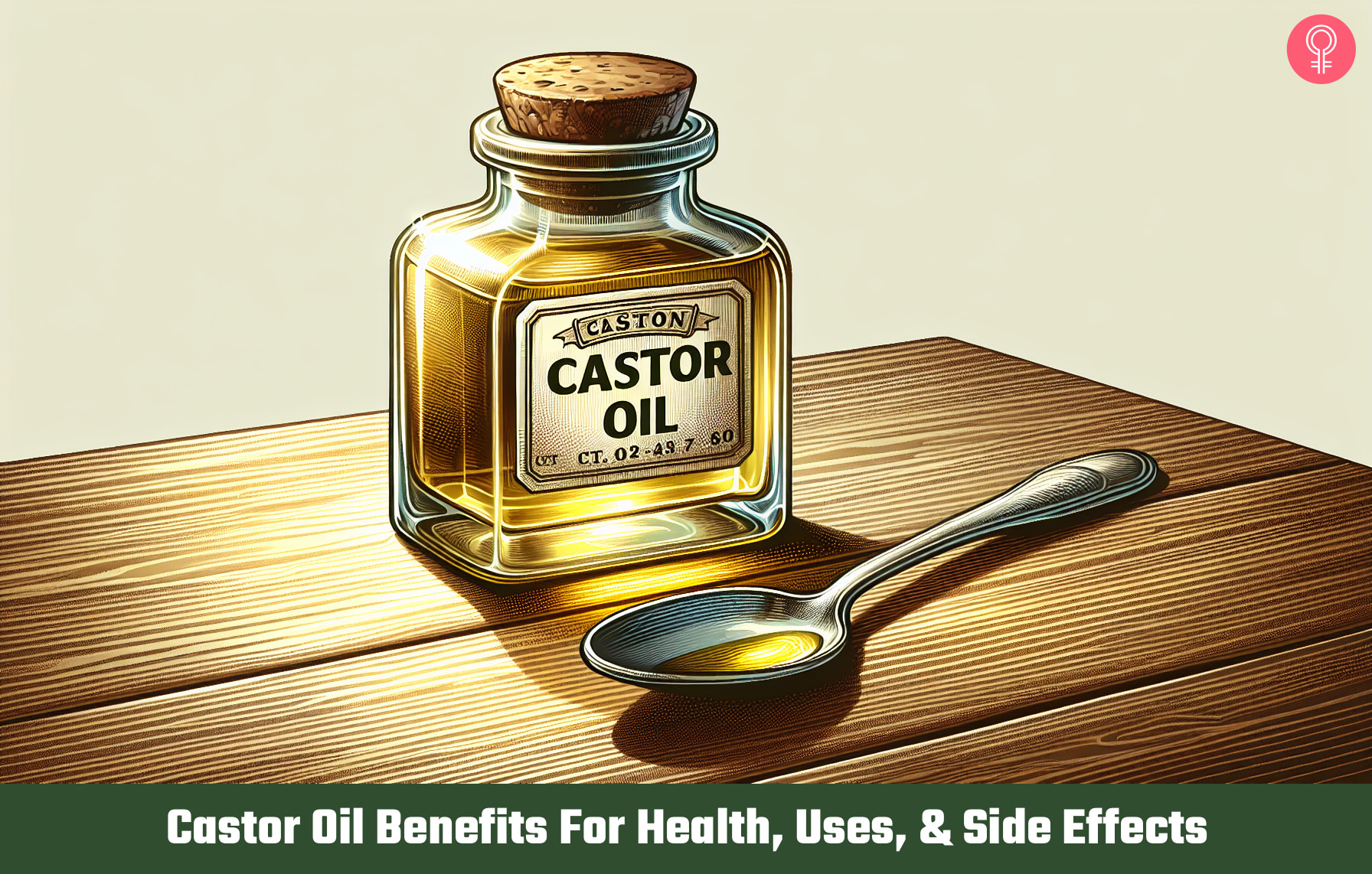
Image: Dall·E/StyleCraze Design Team

















